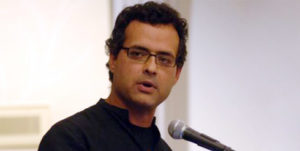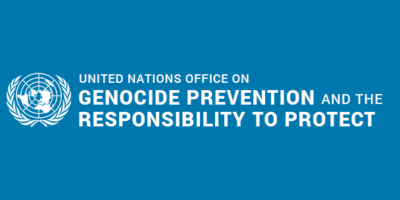R2P – All Member States
PALESTINE ISRAEL GAZA GENOCIDE, 8 Jul 2019
Vijay Prashad | The Beirut Forum – TRANSCEND Media Service
In March 2011, as the UN Security Council deliberated about Libya, I sat with a senior UN official not far from the UN building in New York. It had been an exhausting day, with ambassadors from countries of the Global South buzzing around looking for a way to negotiate the inevitable NATO war on Libya. No one felt it possible for a negotiated settlement, even as the African Union struggled to create space for itself. The draft resolution, which would eventually become UN Security Council resolution 1973, was slowly circulating around the UN buildings. There was boiler plate language, references to Chapter VII of the Charter, which allows armed force, and then a phase that irritated me: that all member states must do this and do that, enforce an arms embargo and produce a no-fly zone. So, I asked the UN official – how many member states do you think can do these things?
Not many, the UN official said. To be frank, only the United States and its NATO partners. No one else can actually enforce this resolution. What would happen, I asked, if ‘regional organisations or arrangements,’ the term used in the resolution, were to act? Libya is bordered by Egypt, Sudan, Chad, Niger, Algeria and Tunisia. Niger and Chad share their air facilities with the French armed forces, with neither having any capacity to launch even a modest no-fly zone (Chad’s air force has no fighter planes and only a few helicopters and transport vehicles). Algeria, Sudan and Tunisia have a handful of fighter planes, but no appetite to test them in a major conflict. Only Egypt has a significant air force, but even it would not have been able to sustain a long-term no-fly zone without external help – notably from France, which has linkages to the militaries of all these countries. Yes, the UN official said, only the United States and the French, as part of NATO, would be able to act in Libya.
The United Nations is unable to act on its own, with no standing army or air force and with reliance upon member states to provide forces for its peacekeeping operations. Even in March 2011, when it was inevitable that someone was going to intervene in Libya, the UN could not begin to marshal its forces. It had to wait for the resolution before it could move. When a resolution is passed, it would take at least six months for the UN to create a force to act in a conflict situation. The UN, said former UN Secretary General Kofi Annan, is the ‘only fire brigade in the world that has to wait for the fire to break out before it can acquire a fire engine.’
In the case of Libya, the UN resolution was shaped around the Responsibility to Protect (R2P) doctrine shepherded through the UN by Annan. But there was little explicit concern that the only powers that had the capacity to enforce an R2P resolution were the United States and its NATO allies (where the US has the largest military presence). The World Summit Outcome Document (2005) noted that ‘we are prepared to take collective action’ using Chapter VII – the use of force (paragraph 139). In this founding document of R2P, there was no clarity on the definition of ‘we’ or of the ‘international community.’ There was a small concession to ‘relevant regional organisations as appropriate,’ a phrase dressed up with enough loopholes to drive a B2 bomber through them. When it counts, a regional organisation is seen to be ‘relevant,’ and besides it would only need to be consulted ‘as appropriate.’ There was no obligation to consult a regional organisation, no obligation to go beyond a Security Council vote to seek any further consensus on the actions that would follow. Everyone knew, when they signed onto the document in 2005, that the onus for the bombing runs would fall on the United States.
It was also clear by 2005 that the United States would get carte blanche to choose which conflicts are worthy of its bombers. Just two years previous to the unanimous endorsement of R2P by UN member states the United States began a war against Iraq which Kofi Annan had called ‘illegal.’ The US used its full military power to pummel Iraq without a Security Council mandate and without consultation with relevant regional organisations as appropriate. It was an illegal war with no fig leaf to cover it. It appeared that the old doctrine of ‘humanitarian intervention’ had been a casualty of the illegal war. But, then, along came R2P to recreate the terms of humanitarian intervention, to rescue a dead doctrine from the ashes of Fallujah. It is quite extraordinary that the member states of the UN surrendered further their sovereignty to the United States government for it to determine where and when to intervene.
Hours after the passage of UNSC resolution 1973, French jets bombed Libya. Ambassadors from many of the Arab states expressed their consternation. They had actually believed that the West would only manage a no-fly zone. They did not anticipate that the French and the US – backed by Saudi Arabia and the UAE – would go for regime change, which is exactly what happened. Within weeks, the NATO bombardment had flattened the institutions of the Libyan state – including the already demoralised army. Libya entered into a state of endless chaos by the summer of 2011.
After the establishment of the R2P principles in 2005, Israel opened up a series of punctual and harsh bombardments against the Palestinians in Gaza. The names of the Israeli operations are lyrical, but the impact was only brutal. A few months after R2P came on the table, Israel conducted Operation Summer Rains (2006) and Operation Autumn Clouds (2006). Two years later, came Operation Hot Winter (2008), followed by the deadly Operation Cast Lead (2008-09). At no time was there a serious discussion in the UN Security Council over the asymmetrical violence against the Palestinians, nor was there a discussion about the annihilationist policies followed by the Israeli government against the Palestinians in the West Bank, East Jerusalem and Gaza. After the destruction of Libya, Israel twice conducted massive bombing campaigns against Gaza – Operation Pillar of Cloud (2012) and Operation Protective Edge (2014). During the latter campaign, Naftali Bennett (then the Minster of Jerusalem and Diaspora Affairs) said that the Israelis should not be blamed for these wars. The Palestinians, he said, were committing ‘self-genocide.’ If anything, the UN should focus attention on the Palestinians who were responsible to protect themselves from themselves. The ‘international community’ – namely the United States and its European allies – nodded in unison.
In abstraction, the R2P doctrine is of great interest. But, in concrete terms, it is merely an instrument of Western power and has been used entirely to extend Western interests on the world stage. To believe that R2P can be harnessed to the cause of the Palestinians is illusionary. The doctrine of R2P needs to be withdrawn. ‘All member states’ need to find another instrument to tackle the destruction of the planet and its peoples. A more robust and precise instrument than one that has been donated to the West for the West to do with it as it pleases.
_______________________________________________
 Vijay Prashad is an Indian historian, editor and journalist. He is a writing fellow and chief correspondent at Globetrotter, a project of the Independent Media Institute. He is the chief editor of LeftWord Books and the director of Tricontinental: Institute for Social Research. He is the author of 18 books, including Arab Spring, Libyan Winter (AK Press, 2012), The Poorer Nations: A Possible History of the Global South (Verso, 2013), Red Star Over the Third World (LeftWord, 2017) and The Death of the Nation and the Future of the Arab Revolution (University of California Press, 2016).
Vijay Prashad is an Indian historian, editor and journalist. He is a writing fellow and chief correspondent at Globetrotter, a project of the Independent Media Institute. He is the chief editor of LeftWord Books and the director of Tricontinental: Institute for Social Research. He is the author of 18 books, including Arab Spring, Libyan Winter (AK Press, 2012), The Poorer Nations: A Possible History of the Global South (Verso, 2013), Red Star Over the Third World (LeftWord, 2017) and The Death of the Nation and the Future of the Arab Revolution (University of California Press, 2016).
Go to Original – thebeirutforum.com
Tags: Conflict, Human Rights, Indigenous Rights, International Relations, Justice, Middle East, Military, NATO, Occupation, Palestine/Israel, Politics, Power, Social justice, Trump, UN, USA, Violence, War, West, World
Join the BDS-BOYCOTT, DIVESTMENT, SANCTIONS campaign to protest the Israeli barbaric siege of Gaza, illegal occupation of the Palestine nation’s territory, the apartheid wall, its inhuman and degrading treatment of the Palestinian people, and the more than 7,000 Palestinian men, women, elderly and children arbitrarily locked up in Israeli prisons.
DON’T BUY PRODUCTS WHOSE BARCODE STARTS WITH 729, which indicates that it is produced in Israel. DO YOUR PART! MAKE A DIFFERENCE!
7 2 9: BOYCOTT FOR JUSTICE!
DISCLAIMER: The statements, views and opinions expressed in pieces republished here are solely those of the authors and do not necessarily represent those of TMS. In accordance with title 17 U.S.C. section 107, this material is distributed without profit to those who have expressed a prior interest in receiving the included information for research and educational purposes. TMS has no affiliation whatsoever with the originator of this article nor is TMS endorsed or sponsored by the originator. “GO TO ORIGINAL” links are provided as a convenience to our readers and allow for verification of authenticity. However, as originating pages are often updated by their originating host sites, the versions posted may not match the versions our readers view when clicking the “GO TO ORIGINAL” links. This site contains copyrighted material the use of which has not always been specifically authorized by the copyright owner. We are making such material available in our efforts to advance understanding of environmental, political, human rights, economic, democracy, scientific, and social justice issues, etc. We believe this constitutes a ‘fair use’ of any such copyrighted material as provided for in section 107 of the US Copyright Law. In accordance with Title 17 U.S.C. Section 107, the material on this site is distributed without profit to those who have expressed a prior interest in receiving the included information for research and educational purposes. For more information go to: http://www.law.cornell.edu/uscode/17/107.shtml. If you wish to use copyrighted material from this site for purposes of your own that go beyond ‘fair use’, you must obtain permission from the copyright owner.
Read more
Click here to go to the current weekly digest or pick another article:
PALESTINE ISRAEL GAZA GENOCIDE:
